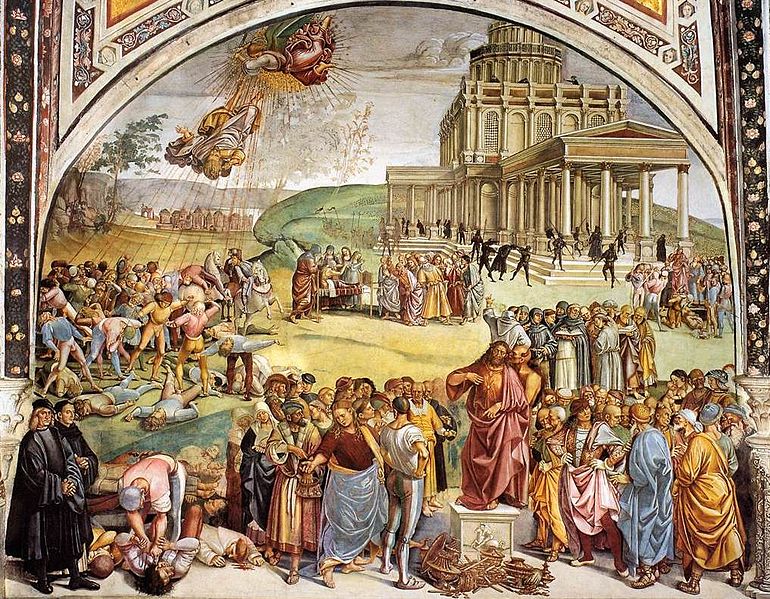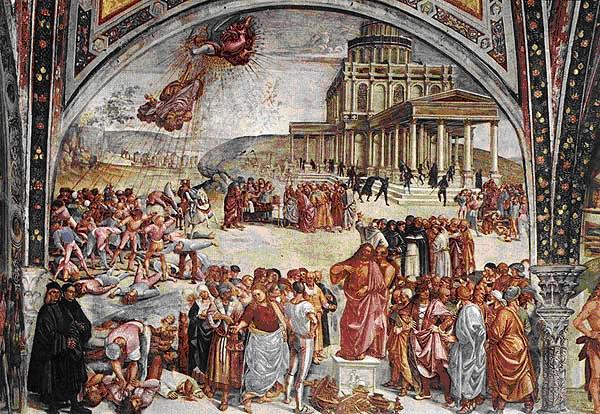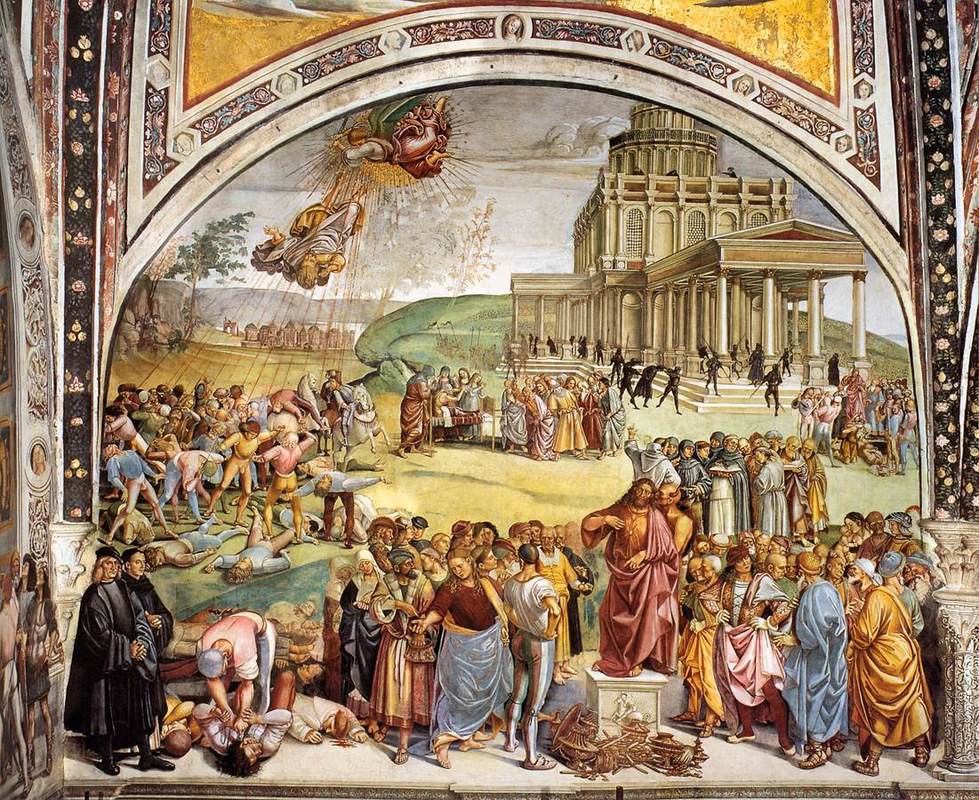1 Thessalonians 4:13-18
Matthew 24:15-28
Pastor James Preus
Trinity Lutheran Church
St. Paul offers to the church in Thessalonica and to us comfort concerning our dead. He does not want us to be ignorant about our loved ones who’ve died, so that we do not mourn as the unbelievers do. Paul doesn’t forbid us from mourning for our dead. Rather, it is good to mourn our dead. Abraham mourned the death of Sarah, the children of Israel mourned the deaths of Aaron and Moses, even Jesus mourned the death of Lazarus. You should not feel ashamed for mourning the death of those you love. Yet, there is a right and wrong way to mourn. As a Christian, you must not mourn as a non-Christian, that is, as one who has no hope. St. Paul, following in the steps of his Lord Jesus, says that Christians who have died have fallen asleep. He uses this euphemism to emphasize that death for the Christian is not eternal. Rather, Christians who die rest from their labors. Their bodies await the resurrection and their souls go to be with Christ. Elsewhere, St. Paul speaks of dying as “to depart and be with Christ, which is far better.” (Philippians 1:23) And Jesus promised the thief on the cross, that when he died, he would be with Him in paradise (Luke 23:43).
So, as we mourn our dead, we should do so with hope in Christ. They are indeed better off than we are now. They neither hunger, thirst, nor suffer in any way, but are with Christ awaiting the glorious resurrection from the dead. And we will see them and be together with them with Christ in the air. Paul exhorts us to comfort one another with these words. However, this comfort is only for those who die in the faith, for only Christ has died for our sins. For those who die trusting in Christ, death is turned into a portal to paradise, where they will with joy and comfort wait for the resurrection. But for those who reject Christ, death is a portal to eternal suffering in hell, where they will wait for the final judgement.
Those who have died with Christ have come out of the great tribulation with robes washed white in the blood of the Lamb and now wait for the resurrection in comfort. We who are alive, who are left until the coming of Christ, will continue to go through this tribulation until Christ redeems what He has purchased with His blood.
In Matthew chapter 24, Jesus juxtaposes the destruction of Jerusalem and the temple in 70 AD with the end of the world, the coming of Christ, and the final judgment. There is good reason for this. The destruction of Jerusalem and the temple is a type of the end of the world, because it shares so many similarities. Before the destruction of the temple and Jerusalem, there were signs in nature, politics, and the church: famines, celestial signs, wars and rumors of wars, false christs and false prophets, and apostasy. All these became signs that God would carry out his judgment upon His city Jerusalem and His house, the temple, as Jesus predicted.
And so, it is today. We are going through the tribulation of the end of the world right now. We are currently living in the end times. In Matthew 24, Jesus warns of wars and rumors of wars. And that is exactly what we are going through. Russia invaded Ukraine. Israel is at war with Hamas. Experts and wannabe experts are warning us about war with Iran, China, and North Korea. World War Three is a frequent topic of discussion even among sober-minded and educated people. There are signs in the church, as Christians face persecution for their faith, and the love of many has grown cold, meaning, many have abandoned the true faith. Abandoning the faith is called apostasy. Jesus warned about famines and earthquakes in various places. In Luke chapter 21, Jesus says that the nations will be distressed because of the roaring of the sea and the waves, people fainting with fear and foreboding. Jesus predicted climate change hysteria nearly two-thousand years ago. And so, we should consider the signs in heaven of moon and sun and the signs in the sea and earth, storms, earthquakes, and fires, as signs of Christ’s coming.
Yet, the most threatening sign in this tribulation is the arising of false christs and false prophets. Since Christ Jesus has rescued us from death and hell, we have no fear of fire, earthquakes, storms, famine, or wars. As the Psalmist says, “The LORD is on my side; I will not fear. What can man do to me?” (Psalm 118:6) Yet, if we lose faith in Christ Jesus, then all is lost! These false christs and false prophets are sent by Satan himself, to lead astray, if possible, even the elect! A prophet is one who speaks for God. False prophets are those who claim to speak for God, but really lead people astray. We have many false prophets today. Christ is Greek for the Hebrew Messiah, both of which mean anointed one. A false christ is one who claims to be anointed by God to lead His Church on earth. Sometimes these false christs claim to be Jesus himself. More often, these false christs claim the authority of Christ to establish doctrine in the Church.
This is where we get the teaching of antichrist. St. John writes in his first and second epistles that antichrists are those who deny that Jesus came in the flesh or who deny the Father and the Son. John tells us that there are many antichrists. And so, looking through history, we can see many antichrists and false christs, who have arisen to lead Christians astray. Arius arose in the fourth century, denying the divinity of Christ Jesus. Mohammad arose in the seventh century, claiming to be God’s prophet, who had seen an angel, telling people that Jesus was not God’s son, nor did He die for our sins. Joseph Smith arose in our own country in the nineteenth century, claiming to have seen an angel, denying that Jesus is the only begotten of the Father, denying the Holy Trinity, and denying that sinners are saved through faith in Christ alone. These were false christs and false prophets, who led many astray.
St. Paul, trying to correct lies written to the church in Thessalonica concerning the coming of Christ, said that Christ would not come until the man of lawlessness came first. This man of lawlessness is recognized as the antichrist. He places himself in the temple of God and claims to be God (2 Thessalonians 2:4). Lutherans have traditionally considered this man of lawlessness to be the office of pope, because the pope calls himself the vicar of Christ on earth and forbids the pure Gospel that sinners are saved by grace through faith in Christ alone apart from their works, and instead has taught salvation by works and has even sold salvation for money in the form of indulgences and masses.
Yet, the pope is not the only one who has fit the description of antichrist. You can’t avoid the antichrist simply by not being a Roman Catholic. There are antichrists throughout Christianity, taking high positions in the church, claiming to speak for God, and leading many astray to damnation. These false christs tell Jesus’ sheep that the Bible is not really the inerrant Word of God, but an assortment of men’s words written about God, of which you can pick and choose what you believe. They’ll follow the example of the false prophets in the time of Jeremiah, saying, “peace, peace,” when there is no peace (Jeremiah 6:14), telling people to embrace their sin, instead of repenting of it. These false christs will attack the ministry of the Word and the Sacraments, throwing Christians into confusion over what to believe and where to find true comfort.
The greatest attack of the antichrist is to place the abomination of desolation into the holy place. There have been several historical events, which theologians have suggested to be the abomination of desolation spoken of by Daniel. Some claim it to be when Antiochus IV Epiphanes sacrificed pigs on a pagan altar in the temple. Others claim it to be when Caius Caligula placed an idol in the temple. And there are other fitting examples in history. What all these events have in common is that they take away the blood of atonement from the holy place. They put an end to sacrifices for a time.
Yet, how do we recognize the abomination of desolation today? The temple, where bloody sacrifices were offered, has been destroyed for over nineteen centuries. How can the holy place be desolated, when the holy place is no more? The temple has been replaced by Christ Jesus, who is the living temple, God in the flesh. The sacrifices of the temple were accomplished once and for all by Jesus’ sacrifice of Himself on the altar of the cross for all our sins. Jesus’ blood now cleanses our hearts through faith (Acts 15:9). Therefore, the abomination of desolation today is when anything replaces the blood of Jesus as the object of our faith.
The abomination of desolation is when anything replaces Christ and His sacrifice on the cross for your sins as the one and only atonement for sins. When your hope of salvation is placed in anything other than Jesus’ blood and righteousness, that is the abomination of desolation standing in the holy place. This is why the rise of the antichrist, false christs and false prophets leading mass apostasy is the greatest sign of the end of the world and Christ’s second coming. Christ must come to put away all false christs and the man of lawlessness once and for all. As God destroyed the very city, which He loved and the temple, which was His dwelling, because of their apostasy, so Christ will destroy the false churches on earth, which claim to be the very house of God.
Just as you do not know when you will die, so you do not know when Christ will return. The signs of the end do not tell you when the end will come, but they are signs of the end, graciously revealed to us by our Savior Jesus, so that you can be prepared. Yet, Jesus promises salvation to His elect. Although the tribulation of the end times seems chaotic and out of control, Christ always remains in control. He is even able to shorten the time for the sake of His elect.
Jesus’ elect are saved through faith alone in Christ alone. The elect are chosen in Christ to be saved through faith in Christ. So, while the tribulation of the end times should awaken us from slumber, idleness, and apathy, so that we seek Christ’s grace in the Gospel, we, Christ’s elect should not fear the tribulation of the end times. As assuredly as we have washed our robes in the blood of Christ, so will we come out of this great tribulation for Christ’s sake to join our departed loved ones in paradise. Amen.



 RSS Feed
RSS Feed